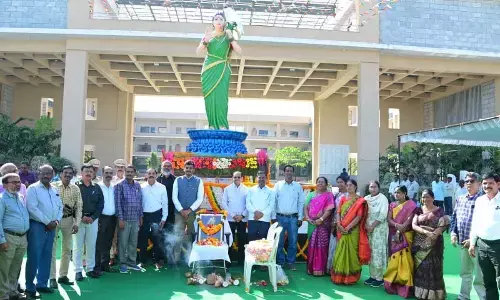Villages 'vanishing' in Anantapur Dt

- Farmers are facing an existential crisis. With huge debts staring at them, they are left with no alternative but to sell their lands to the land sharks
- Corporate honchos and realtors circumvent land-ceiling laws using loopholes in them
- Farmers turn labourers in their own fields to sustain themselves
- Farmers, agriculture workers migrating to cities
 Anantapur: Villages in the perennially drought-prone Anantapur district are gradually disappearing from the map as their inhabitants are migrating to urban areas to eke out a living. The reason is, with recurring droughts year after year, the farmers are finding it difficult to invest in cultivation as mounting losses are pushing them into deep indebtedness. The villages, once famed for peaceful and contended life of rural folk, are now deserted and desolated. The farmers, agricultural workers and artisans are migrating to 'greener pastures' in the labyrinths of concrete jungles in towns and cities to find employment and raise their families. In the process, they are selling their land holdings in distress. Industrialists, rich people and politicians from all over the country are descending on the drought-prone and arid Anantapur district, abutting Karnataka, to buy thousands of acres of agricultural land for corporate farming. As they are buying land in bulk, some villages are disappearing. One such vanishing village is Chandrayunipalli in the panchayat limits of Muktapuram in Mudigubba mandal. This village had 50 families dependent upon agriculture. A district-level leader of Telugu Desam Party (TDP), Varadapuram Suryanarayana, bought all 500 acres of land in the village. He reportedly paid Rs50,000 to Rs1 lakh per acre to the farmers. He is planning to raise commercial crops through drip irrigation and has already dug 15 bore wells. In another case, a software firm proprietor J A Choudhary is said to have bought 100 acres in the Bukkapatnam mandal in the name of Adi Foundation at similar price. He is said to have acquired 400 acres of land near Bagepalli and had already embarked on corporate farming. In Roddam mandal alone, farmers have sold off 47, 863 acres of land in the last three years, according to government records which show corporates have acquired about 15,000 acres of agriculture land in Somandepalli mandal and 10,000 acres in Penukonda mandal for farm houses. A Bangaluru-based realty firm is developing a cluster of luxury villas in 100 acres near Penukonda town. Several villages in Bathalapalli, Kadiri, Nambulapulakunta, Penukonda, Dharmavaram and Gorantla mandals have gone into the hands of corporate land sharks. In Dodagatta village of Roddam mandal, corporate farmers and realtors from Rajasthan, Punjab and Karnataka have acquired 90 percent of the land totaling about 1,227 acres. Some realtors and politicians have bought all the land in the villages of Nambula Pulakunta and Cheruvuvandlapalli villages. In Somandepalli mandal, some corporate farmers from Punjab and Haryana have bought about 2,000 acres abetting the National Highway. Each one of them has bought about 500 acres, it is learnt. In Reddypalli Panchayat in Nallamada mandal, a Chandigarh-based firm, Gad Unique Builders Pvt. Ltd., has bought 1,650 acres. Such companies have bought thousands of acres in Charupalli in Reddypalli panchayat, Mathyala Chervu and Odi chervu in Kadiri area. Several villages on the verge of extinction Land sharks, corporate farmers and politicians from all over the country have reportedly bought about 70,000 to 80,000 acres in Anantapur district so far, according to knowledgeable sources. With the land changing hands from the native villagers to the corporates, realtors and politicians, several villages are on the verge of extinction and they would soon slip into government record books. On the other hand, the farmers whose sole dependency is on their lands are facing an existential crisis. With huge debts staring at them, they are left with no alternative but to sell their lands to the land sharks as they seemingly offer attractive prices. Later, the same lands would be transformed into corporate farms, farmhouses for the rich and famous and horticulture farms with huge finances they could leverage from the commercial banks. The land sharks after buying the lands from farmers level and fence them. Later they will take huge loans from banks and apply for government subsidies to develop their lands. They embark on corporate farming by deploying latest techniques. To beat the laws, the corporate honchos and realtors register the lands in the name of agri-farms and third parties (benami names). They take care not to attract land-ceiling laws by registering less than the maximum ceiling permitted. For example, Thimmareddy, a farmer from Attibeli village in the neighboring Karnataka, has bought 39 acres of land in Cherukur from the farmers. He used the government subsidies and developed the land as a farm by fencing it. He is raising crops using latest techniques and earning handsome profits. Ironically, the farmers who sold the land to Thimmareddy are now working in the farm as labourers to sustain themselves. Anantapur is one of the two districts in the country that receives minimum rainfall. On an average, it gets 552 ml of rainfall a year. But in the last two years, the average rainfall has been only 400 ml. There are about 25 lakh acres of cultivable land in the district of which only 10 percent has irrigation facilities. In these circumstances, the buying up of huge tracts of land in the district by the corporates, realtors and politicians has become a hot topic of debate. Several questions are being raised about violation of Land Ceiling Act, Registration Act etc., as hundreds of acres could not be registered to one person or entity except for industrial use. To acquire land for industrial use, the State government has to change the land use rules in the area. Realtors could not possibly buy agriculture lands to develop villas or farmhouses without changing the land use rules. The district administration and the State government should wake up and take steps to save villages from disappearing on the ground and remain in the records of history. Tales of distress
Anantapur: Villages in the perennially drought-prone Anantapur district are gradually disappearing from the map as their inhabitants are migrating to urban areas to eke out a living. The reason is, with recurring droughts year after year, the farmers are finding it difficult to invest in cultivation as mounting losses are pushing them into deep indebtedness. The villages, once famed for peaceful and contended life of rural folk, are now deserted and desolated. The farmers, agricultural workers and artisans are migrating to 'greener pastures' in the labyrinths of concrete jungles in towns and cities to find employment and raise their families. In the process, they are selling their land holdings in distress. Industrialists, rich people and politicians from all over the country are descending on the drought-prone and arid Anantapur district, abutting Karnataka, to buy thousands of acres of agricultural land for corporate farming. As they are buying land in bulk, some villages are disappearing. One such vanishing village is Chandrayunipalli in the panchayat limits of Muktapuram in Mudigubba mandal. This village had 50 families dependent upon agriculture. A district-level leader of Telugu Desam Party (TDP), Varadapuram Suryanarayana, bought all 500 acres of land in the village. He reportedly paid Rs50,000 to Rs1 lakh per acre to the farmers. He is planning to raise commercial crops through drip irrigation and has already dug 15 bore wells. In another case, a software firm proprietor J A Choudhary is said to have bought 100 acres in the Bukkapatnam mandal in the name of Adi Foundation at similar price. He is said to have acquired 400 acres of land near Bagepalli and had already embarked on corporate farming. In Roddam mandal alone, farmers have sold off 47, 863 acres of land in the last three years, according to government records which show corporates have acquired about 15,000 acres of agriculture land in Somandepalli mandal and 10,000 acres in Penukonda mandal for farm houses. A Bangaluru-based realty firm is developing a cluster of luxury villas in 100 acres near Penukonda town. Several villages in Bathalapalli, Kadiri, Nambulapulakunta, Penukonda, Dharmavaram and Gorantla mandals have gone into the hands of corporate land sharks. In Dodagatta village of Roddam mandal, corporate farmers and realtors from Rajasthan, Punjab and Karnataka have acquired 90 percent of the land totaling about 1,227 acres. Some realtors and politicians have bought all the land in the villages of Nambula Pulakunta and Cheruvuvandlapalli villages. In Somandepalli mandal, some corporate farmers from Punjab and Haryana have bought about 2,000 acres abetting the National Highway. Each one of them has bought about 500 acres, it is learnt. In Reddypalli Panchayat in Nallamada mandal, a Chandigarh-based firm, Gad Unique Builders Pvt. Ltd., has bought 1,650 acres. Such companies have bought thousands of acres in Charupalli in Reddypalli panchayat, Mathyala Chervu and Odi chervu in Kadiri area. Several villages on the verge of extinction Land sharks, corporate farmers and politicians from all over the country have reportedly bought about 70,000 to 80,000 acres in Anantapur district so far, according to knowledgeable sources. With the land changing hands from the native villagers to the corporates, realtors and politicians, several villages are on the verge of extinction and they would soon slip into government record books. On the other hand, the farmers whose sole dependency is on their lands are facing an existential crisis. With huge debts staring at them, they are left with no alternative but to sell their lands to the land sharks as they seemingly offer attractive prices. Later, the same lands would be transformed into corporate farms, farmhouses for the rich and famous and horticulture farms with huge finances they could leverage from the commercial banks. The land sharks after buying the lands from farmers level and fence them. Later they will take huge loans from banks and apply for government subsidies to develop their lands. They embark on corporate farming by deploying latest techniques. To beat the laws, the corporate honchos and realtors register the lands in the name of agri-farms and third parties (benami names). They take care not to attract land-ceiling laws by registering less than the maximum ceiling permitted. For example, Thimmareddy, a farmer from Attibeli village in the neighboring Karnataka, has bought 39 acres of land in Cherukur from the farmers. He used the government subsidies and developed the land as a farm by fencing it. He is raising crops using latest techniques and earning handsome profits. Ironically, the farmers who sold the land to Thimmareddy are now working in the farm as labourers to sustain themselves. Anantapur is one of the two districts in the country that receives minimum rainfall. On an average, it gets 552 ml of rainfall a year. But in the last two years, the average rainfall has been only 400 ml. There are about 25 lakh acres of cultivable land in the district of which only 10 percent has irrigation facilities. In these circumstances, the buying up of huge tracts of land in the district by the corporates, realtors and politicians has become a hot topic of debate. Several questions are being raised about violation of Land Ceiling Act, Registration Act etc., as hundreds of acres could not be registered to one person or entity except for industrial use. To acquire land for industrial use, the State government has to change the land use rules in the area. Realtors could not possibly buy agriculture lands to develop villas or farmhouses without changing the land use rules. The district administration and the State government should wake up and take steps to save villages from disappearing on the ground and remain in the records of history. Tales of distress  Jaganmohan Reddy, a farmer, used to own 31 acres in Dodagatta village. Due to natural calamities and drought situation for the last few years, he had been pushed into indebtedness. He invested heavily to raise groundnut, red gram and other commercial crops and incurred heavy losses in the last few years. To clear his losses, he sold away 21 acres to the land sharks and cultivated the remaining ten acres last year. Again, due to drought, he again incurred loss and now migrated to his wife's native place in Karnataka. He brought a cow and is eking out a living with supplementary income from his wife's tailoring and educating his two children in Hindupur. He is now worried over his future. The situation is not peculiar to him alone. His two brothers also migrated to Bangalore and are working as casual employees. Another young man from the village, Lokesh is in similar situation. He cultivated his five acres and incurred heavy losses. To repay the debts, he sold his five acres and turned shepherd to support his family. The situation of everybody in the village is the same.
Jaganmohan Reddy, a farmer, used to own 31 acres in Dodagatta village. Due to natural calamities and drought situation for the last few years, he had been pushed into indebtedness. He invested heavily to raise groundnut, red gram and other commercial crops and incurred heavy losses in the last few years. To clear his losses, he sold away 21 acres to the land sharks and cultivated the remaining ten acres last year. Again, due to drought, he again incurred loss and now migrated to his wife's native place in Karnataka. He brought a cow and is eking out a living with supplementary income from his wife's tailoring and educating his two children in Hindupur. He is now worried over his future. The situation is not peculiar to him alone. His two brothers also migrated to Bangalore and are working as casual employees. Another young man from the village, Lokesh is in similar situation. He cultivated his five acres and incurred heavy losses. To repay the debts, he sold his five acres and turned shepherd to support his family. The situation of everybody in the village is the same.  We have eight acres of land. There have been drought conditions for the last two years. Even if it rains, we are afraid of venturing into cultivation because of the labour shortage problem. Already 40 to 50 farmers from our village have sold away their lands and migrated to other places. - Nagesam, Garladinne village
We have eight acres of land. There have been drought conditions for the last two years. Even if it rains, we are afraid of venturing into cultivation because of the labour shortage problem. Already 40 to 50 farmers from our village have sold away their lands and migrated to other places. - Nagesam, Garladinne village  We have 20 acres of land. For the last five years, crops failed due to drought. Several people from Hyderabad and Bangaluru approached us to purchase our land. We are seriously thinking of selling it off. - Venkatesam, Anantapur
We have 20 acres of land. For the last five years, crops failed due to drought. Several people from Hyderabad and Bangaluru approached us to purchase our land. We are seriously thinking of selling it off. - Venkatesam, Anantapur  We had ten acres of land. Three acres were already sold off. We could not raise crops in the remaining land due to lack of rains. We are eking out a living by rearing sheep. - Mahesh, Anantapur
We had ten acres of land. Three acres were already sold off. We could not raise crops in the remaining land due to lack of rains. We are eking out a living by rearing sheep. - Mahesh, Anantapur Next Story








